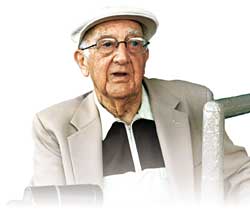

------------------------------------------------------------------------
 |
Hal Rose Those who proselytized the world would end on Jan. 1, 2000, were wrong. The world actually came to an end on March 11 at 5:52 p.m. That was the moment when 28,033 people at Gulfstream Park, most with losing tickets in hand, stood and cheered, applauded, cried, and otherwise showed their affection for a racehorse named Hal's Hope, his diminutive 88-year-old breeder, owner, and trainer Hal Rose and Hal's wife Elsie. Losers joined winners in a group embrace so warm that, if fondness were a pari-mutuel wager, the minus pool would have put the track out of business. |
Copyright © 2000 The Blood-Horse, Inc. All rights reserved.
4/3/2000